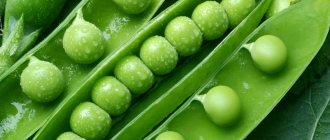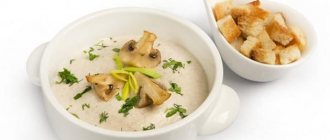Avocado is an overseas fruit that appeared on supermarket shelves relatively recently. However, in a fairly short time it gained popularity among gourmets.
Avocado or alligator pear as it is also called is eaten raw. Most often they are added to salads, but sometimes eaten as an independent dish. Due to its high fat content, one fruit can replace a full breakfast or be eaten between main meals to satisfy hunger. You just need to understand that the bone should not be eaten, as it is poisonous.
One important question remains to be clarified: can children eat avocados, and if so, at what age?
Benefits of Avocado
The main benefit of the alligator pear, like any other fruit and berries, is the vitamins it contains in large quantities. In particular, B vitamins, which help strengthen the nervous system, affect mood, and stimulate mental activity. All this indicates that avocados are just as beneficial for children as they are for adults, especially for schoolchildren who are constantly under mental stress.
This fruit also has other beneficial properties:
- it improves metabolism, which makes it possible to include it in the diet of obese children;
- alleviates the condition during an attack of tachycardia;
- helps stop diarrhea;
- increases appetite, which is important if the child is a small child;
- improves liver function and blood composition;
- helps strengthen muscles;
- it can be included in the menu of a child with low hemoglobin;
- Those who regularly ate avocados had a much lower incidence of cancer.
The beneficial properties of avocado do not end there, but they also apply to adults, for example, this fruit lowers blood cholesterol in a fairly short time.
This exotic fruit appeals to adults, and many are interested in the question of whether children can eat avocados, and if so, at what age. It's definitely possible. After all, all of the above beneficial properties of avocados will come in handy for children’s bodies. The second question requires a more detailed answer.
In many countries, avocado is considered a powerful aphrodisiac. In Aboriginal tribes, it is customary to give this fruit, in large quantities, to newlyweds so that they have many children.
Incredible nutritional value
Avocados are valued mainly for their high nutritional value. All over the world, due to its taste and rich texture, it is added to a variety of dishes.
We are talking about the main component of guacamole. Due to the vitamins and minerals present in avocado, it is included in their diet by fans of a healthy lifestyle, who claim that it is one of the so-called. superfoods.
Avocado oil is no less beneficial for the body; you can learn more about it from this article
The most important nutrients and vitamins contained per 100 g serving and their percentage of the recommended daily intake are:
| Substance | Properties | Percentage of recommended daily dose |
| Vitamin K | Influences optimal protein absorption, strengthens blood vessels and prevents osteoporosis and the risk of fractures | 26% |
| Folic acid | Acts as an effective antioxidant, prevents fetal defects during pregnancy | 20% |
| Vitamin C | Acts as an immunity booster and is involved in a number of processes in the body | 17% |
| Potassium | Responsible for proper water management, nervous system health and muscle activity | 14% |
| Vitamin B5 | Known as pantothenic acid, it is an important element in the metabolism of essential nutrients - fats, sugars and proteins. Helps against depression and insomnia | 14% |
| Vitamin B6 | Essential for the nervous and immune systems, helps prevent the risk of heart disease | 13% |
| Vitamin E | Protects cells from harmful radicals and reduces the risk of dementia | 10% |
Avocados contain significant amounts of iron, zinc, phosphorus, thiamine, manganese, magnesium, copper and vitamins B1, B2 and B3, as well as a number of beneficial antioxidants.
77% of calories come from healthy unsaturated fatty acids, especially oleic acid, which in the body acts as a factor in the prevention of cardiovascular diseases. Fats help you better absorb certain health-promoting substances, especially vitamins and antioxidants.
When avocados are consumed with other fruits and vegetables, the health benefits are multiplied. Iron intake increases, which is important in particular for adolescent children, pregnant women and people with anemia.
Another 7% of the fruit's volume is fiber, which benefits digestion and creates a lasting feeling of fullness. For this reason, the natural delicacy is popular as a component of various diets. 100 grams of avocado contains:
- calories – about 160;
- protein – 2 g;
- healthy fats – 15 g;
- carbohydrates – 9 g;
- fiber – 7 g;
- “clean” carbohydrates – only 2 g.
Article for you:
Beetroot - health benefits and harms
This is why the fruit is ideal for low-carb diets. However, due to its relatively high energy value, the question arises, how many avocados can you eat per day?
Most nutritionists agree that the optimal daily portion should not exceed half the fruit. But, if you are not prone to excess weight, consuming the whole fruit is completely acceptable.
The fruit does not contain cholesterol, sodium, and contains a minimum of saturated fat. Although it is now known that cholesterol is not as harmful as everyone previously thought, some “old school” experts recommend it precisely because of the absence of this substance.
At what age can you give your child avocados?
But this is the most controversial issue. Doctors' opinions on the age at which alligator pears can be given to children vary greatly. We will publish them all, but the best solution to this issue would be to consult with your pediatrician, who knows the child’s condition, his body’s reaction to certain foods, and will give recommendations regarding avocados.
- The first opinion is that the fruit can be introduced even up to 1 year, in the first complementary feeding. Its tender pulp is well absorbed by the baby's stomach, and omega-3 fatty acids will be the right addition to the vitamin D complex that is given to all children. In Europe, avocado puree begins to be given from 6 months, sometimes in its pure form, sometimes with zucchini.
- However, there are also opponents of this opinion, who do not recommend including an exotic product on the baby’s menu, the body’s reaction to which is unpredictable. It is better to abstain until 2 years.
- Third opinion: avocado can be given to a child from 3 years old. The benefits of it are undeniable, but the fruit can also cause harm. The thing is that it contains latex, which is a strong allergen.
What opinion should parents adhere to? The one that will be expressed by the pediatrician observing the child. He knows exactly about the child’s health characteristics and will give the right advice.
Avocado with zucchini for children
- 50 g zucchini
- 1/2 avocado
Step-by-step recipe for “Avocado with zucchini”:
- Wash and peel the zucchini well, then cut into pieces.
- Cook the zucchini in a small amount of water (100 ml) covered for about 10 minutes.
- Remove the zucchini and let it cool slightly.
- Meanwhile, cut the avocado in half lengthwise and remove the seeds.
- Mash half an avocado with a fork.
- Combine avocado puree with zucchini, bring to the consistency of soft puree, adding vegetable broth.
How much can you give avocados to your baby?
You need to start introducing exotic fruit into your baby’s diet gradually. The first portion should not exceed one dessert spoon. At three years old, children can be fed about half of one fruit.
After the first test, you need to carefully monitor the body’s reaction to the alligator pear: there is no diarrhea, rashes, or itching. If everything is in order, you can continue to give the fruit in the same amount as the first time, and then gradually increase the portion. Over time, avocado can be mixed with other fruits: kiwi, banana, cucumber, served in salads, in yoghurts.
Use for body health
Did you know that avocados contain more potassium than bananas? Potassium is an element that most people don't have enough in their bodies. This is a nutrient that helps maintain electrical gradients in the body's cells and has various functions.
The tropical fruit is characterized by a very high potassium content. 100 g contains 14% of the recommended daily dose of potassium.
In comparison, a banana, considered a high-nutrient food, may only cover 10% of the recommended daily intake. Some studies show that increased potassium intake is associated with lower blood pressure, a significant risk factor for heart attacks, strokes and kidney failure.
Help with weight loss
There is a lot of evidence of the beneficial properties of the fruit for weight loss. In one study, a group of people was divided into 2 parts: one included natural treats in their diet, the other did not. Test takers were asked to answer a series of questions about their feelings of hunger and satiety. People who ate avocados felt 23% more satisfied with their food and had 28% less hunger over a 5-hour period.
This effect provides a high fiber content and very low carbohydrate content. These two factors contribute to weight loss.
Reducing cholesterol and triglyceride levels The most common cause of death worldwide is coronary heart disease. Certain blood markers are known to be associated with a higher risk of this disease. These include: cholesterol, triglycerides and inflammatory markers, poor blood pressure and other causes.
One study examined these risk factors in 8 people. People, as in the previous case, were divided into 2 groups, one of which regularly consumed avocado. Over time, it was found that individuals who included it in their diet had approximately a 20% reduction in triglycerides and a 20% reduction in LDL cholesterol, with an 11% increase in HDL (good) cholesterol. It is enough to consume half a fruit per day.
Constipation The soluble dietary fiber contained in the fruit has a beneficial effect on friendly intestinal bacteria, which are important for optimal bowel function.
A 100 g serving contains 7 g of fiber, which is 27% of the recommended daily intake. About 25% of fibers are soluble, 75% are insoluble.
Thanks to fiber, the fruit helps relieve constipation. It is enough to eat only 1.5 pieces a day, but regularly.
Cancer Prevention and Treatment To date, there is only limited evidence that avocados may be beneficial for cancer prevention. However, one study found that it helps reduce the side effects of chemotherapy in human lymphocytes.
Its extract has been shown to inhibit the growth of prostate cancer cells. However, it is important to keep in mind that these studies were performed on isolated cells, which is not analogous to cell conditions in a living person.
Experts say low folic acid intake increases the risk of breast cancer in women. Taking enough of this substance may help prevent colon, stomach, or pancreatic cancer.
Diabetes Despite the relatively high carbohydrate content, this is a fruit recommended for consumption for diabetes. The course of the disease is significantly influenced by dietary fiber and unsaturated fats, which are sufficient in the fruit. To stabilize glycemia, it is recommended to eat half a fruit per day.
Article for you:
Medicinal properties and method of use of fresh lingzhi mushroom, recipes, instructions for use of tablets, powder, coffee, tea
How to choose an avocado and how to store it
The appearance of the fruit depends on its variety. There are mainly four of them on Russian markets: “Gwen”, “Reed”, “Fuerte” and “Zutano”. The fruits of the “Gwen” and “Reed” varieties are large, the flesh is yellowish, the latter’s skin resembles a pimply cucumber. “Fuerte” is sweeter than the others, its skin is smooth. "Zutano" has firm, lighter flesh and a smooth skin. In principle, the composition of nutrients in each variety is approximately the same, so when choosing an avocado, the variety will not play a decisive role.
It is much more important that the fruit is fresh, otherwise it will only cause harm to the baby. An unripe avocado is too hard to the touch. Its taste will be tart. Overripe fruit is too soft. Under no circumstances should you take it for a child, as the pulp may have already begun to rot or ferment. The best option is when the fruit has a medium degree of softness, and when pressed, quickly restores its shape.
You can also trust your hearing when choosing an avocado. Just shake it and listen to whether the seed makes sounds of hitting the shell. If yes, the fruit is ripe. However, the unripe one can lie down and reach its ripeness. You should not buy fruit with dark spots on the peel. This may indicate that it is rotten.
The fruit can be stored at room temperature. It is a mistaken belief that it needs to be placed in the refrigerator, as it quickly deteriorates.
The beneficial properties of fresh fruits are undeniable, so your child should be given them.
Avocado recipes for children
Green salad
- White cabbage – 200 grams;
- Avocado – 1 fruit;
- Green apple – 1 piece;
- Green onion – 2 arrows;
- Dill – 2 sprigs;
- Lemon – 1⁄2 pieces.
Peel the avocado, remove the pulp, and remove the zest from the lemon. Finely chop the cabbage, peel the apple and grate it along with the avocado. Mix the ingredients, pour in lemon juice and add lemon zest. Chop the onion and parsley, add to the salad and season with olive oil.
Cream soup
- Avocado – 1 fruit;
- Cream – 1 tablespoon;
- Chicken bouillon;
- Small toasts made from wheat bread.
Peel the avocado, extract the pulp and mix with cream. Grind to a puree consistency and pour into heated chicken broth, bring to a boil. Place chopped herbs and croutons into the prepared soup.
Butter for sandwich
You can make delicious avocado butter for your breakfast sandwich. To do this, mix the fruit pulp with lemon juice and spread on bread. Lightly salt, if desired, place a piece of hard cheese or sausage on top. You will find even more delicious and healthy recipes for children at the link
Contraindications
Like any other product, avocado has its contraindications for consumption by children. Allergy sufferers need to be especially careful; they may have a negative reaction to latex. Latex is used as a stuffing material in mattresses and upholstered furniture, and is also used to make baby pacifiers, rodents, toys and other products.
If you are intolerant to certain fruits, including avocados, allergic dermatitis does not appear immediately after eating them, but after the body comes into contact with latex products. This is the so-called cross allergy. You can find out if you are allergic to latex by testing for banana. If there is, then avocados should not be given. You should also be careful if you have an intolerance to citrus fruits.
The peel must be cut off, the pit removed, and the pulp passed through a blender or crushed.
So, children can eat avocados, from infancy. However, it is necessary to consult a pediatrician and choose the right fruit. And let it bring only benefits to your baby.
We also recommend reading: Can a child have honey from bees? Read all the most useful things on our website: Is it possible for a child?











